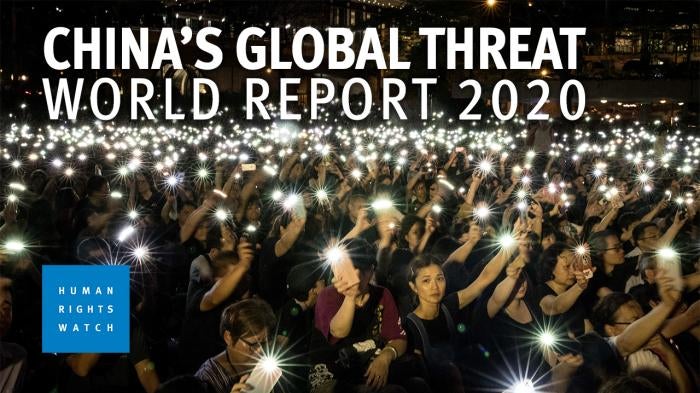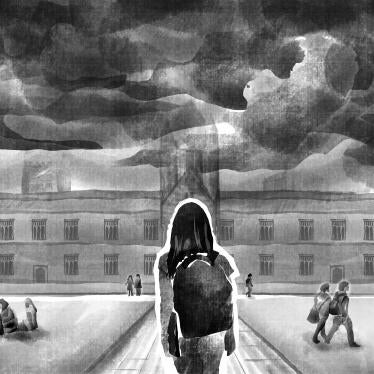President Xi Jinping is overseeing China’s most pervasive and brutal oppression in decades. Dissidents are silenced. Civic groups are shut down. Independent journalism is no more. Online conversation is curtailed. Hong Kong’s limited freedoms are challenged. And for the Uighur and other Turkic Muslims of Xinjiang, Beijing has built the world’s most intrusive system of surveillance coupled with the detention of more than one million people for forced indoctrination.
Beijing’s priority has been to avoid international criticism of these deeply disturbing trends. Having long censored what people can say in China, Beijing is now trying to censor criticism across the globe. In doing so, it is increasingly threatening the entire international system that protects the rights of people worldwide.
Some dictators and autocrats are happy to go along with China since they, too, dislike criticism for their human rights violations. Others are simply bought off, such as by China’s Belt and Road Initiative, a trillion-dollar infrastructure and investment program.
Some European governments have encountered Beijing’s threat to cut off access to the Chinese market, representing 16 percent of the world economy. The Chinese government uses that threat as part of its divide-and-conquer strategy, which has made it especially hard for European Union members to reach a strong consensus on China.
Beijing has made the United Nations a major target. At the UN Human Rights Council, China routinely opposes virtually every human rights initiative that firmly criticizes a specific country. At UN headquarters in New York, the Chinese government is determined to avoid discussion of its conduct in Xinjiang. UN Secretary-General Antonio Guterres has refused to publicly demand an end to China’s mass detention of Turkic Muslims.
At the UN Security Council, China joins with Russia to block action on dire situations in places such as Syria, Myanmar, and Venezuela. Beijing would rather leave the victims to their fate than generate a precedent of defending rights that might boomerang on its own repressive rule.
European governments have begun to recognize China’s threat to the global human rights system. The European Union has made several strong statements on Xinjiang at the Human Rights Council, including one that became the basis for the largest joint governmental statement that China has ever faced. The European Parliament has also consistently added its voice, and in December awarded the imprisoned Uighur academic Ilham Tohti the prestigious Sakharov Prize.
But there is more that the European Union and its member states can do. To begin with, European leaders who meet Chinese officials should recognize that their default reliance on quiet diplomacy doesn’t work to advance human rights effectively. If the people of China—the main engine of change—can’t hear the European leaders, their interventions make little difference.
Similarly, EU governments should make sure to treat the periodic EU-China dialogue on human rights as an additional opportunity to address rights issues, not as an excuse to avoid public mention of rights issues at higher-profile summits. That’s a particularly important lesson as Germany prepares for a major EU-China summit in Leipzig during its EU presidency in the second half of 2020.
European governments should avoid double standards for China. If they seek to hold Myanmar officials accountable for their abusive treatment of Rohingya Muslims, why not Chinese officials for the Uighur Muslims? If they are attentive to Saudi or Russian efforts to buy legitimacy and pave over rights abuses, why not similar Chinese efforts? If they encourage debates about human rights violations by Israel, Myanmar, or Venezuela, why not by China? Many rightly challenged the Trump administration’s appalling separation of children from their parents on the US-Mexico border, so why not also challenge Beijing’s separation of children from their parents in Xinjiang?
Finally, European governments should not submit to China’s divide-and-conquer strategy. When governments deal with China on their own, they often opt for silence, but if they band together, the power balance shifts.
Ideally, all members of the European Union should speak together, but a single dissenter can transform a powerful statement into mush. In such cases, it is better to join together as many European governments as are willing to firmly stand up to Beijing’s assault on human rights, including the UK government after Brexit. Yes, the Chinese government will threaten economic retaliation, but its economy cannot take on everyone at once.
Moreover, Europe has its own economic clout to wield—for example, by insisting that all companies ensure that their supply chains are free of the large-scale forced labor of Muslims now being used in Xinjiang.
The bottom line is that every European government should recognize the need to resist the Chinese government’s attack on the international human rights system. Decades of progress on human rights are at stake. So is our future.









